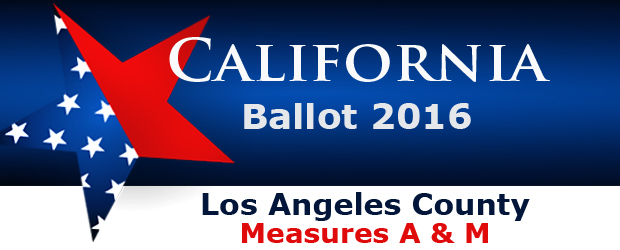California Ballot 2016: Los Angeles County Measures A & M
Environmental Litigation
This is the fourth and final blog in our 2016 California Election Guide Series – the first three providing brief synopses of the 17 state-wide ballot initiatives residents will see in November. In this final segment, we will cover the two Los Angeles County measures. (For those of you looking for information regarding the city measures, go here.)

Measure A: Safe, Clean Neighborhood Parks

This is also known as the Safe, Clean Neighborhood Parks, Open Space, Beaches, Rivers Protection, and Water Conservation Measure, which incorporates an annual 1.5 cent tax per square foot of building area on property owners. That works out to be less than $23 per year for an owner of a 1,500 square foot home.
In general, it continues funding for parks, open spaces and water resources. But more specifically, Measure A aims to:
- Maintain safe, clean parks and playgrounds
- Reduce gang activity
- Keep senior recreation centers
- Maintain safe drinking water
- Protect beaches, rivers and other natural bodies of water
Funding for these efforts primarily came from propositions passed in 1992 (which ended last year) and 1996 (which will sunset in 2019).
Who’s Voting Yes on Los Angeles County’s Measure A?
Various city, county and state officials; environmental groups, and the Los Angeles Times all recommend voting yes on LA’s Measure A. They claim the measure is necessary to provide safe places for a variety of child and senior activities. The initiative also protects natural areas that haven’t been developed yet; and implements water conservation efforts through recycling, capturing and cleaning rainwater, and converting landscapes with drought-tolerant plants.
Who’s Voting No on the Los Angeles Park Measure?
Organized opposition seems to be practically nonexistent, though the president of the Los Angeles Area Chamber of Commerce expressed some concern. He says for one thing, the state ballot is too crowded and so the priorities for county voters should be on transportation and homelessness problems. The tax rate formula was also at issue, as President Gary Toebben claims a levy based on square footage just penalizes business owners, which tend to have larger taxable properties.
Measure M: Los Angeles County Traffic Improvement Plan

The goal of Measure M is simply to improve transportation via a half cent sales tax increase. The tax will cover:
- Traffic flow and safety on freeways (including improved interchanges)
- Road and sidewalk repairs
- Earthquake retrofitting of bridges
- Synchronization of traffic signals
- Public transportation expansion
- Affordability of transportation fares for seniors, students and the disabled
- Connections to jobs, schools, airports (including a new LAX station)
- Job creation
Who’s Voting Yes on Measure M?
A variety of LA County cities and their councils, AARP California, the American Heart & Stroke Associations, California Walks, the Green Party of California and others have all come out in favor of transportation improvement bill, according to Yes on M.
The organization claims population increases in the county require an improved transportation system, and that improvements will reduce the time commuters are stuck in traffic by 15 percent.
Who’s Against Measure M’s Transportation Improvements?
Some Measure M opponents like LA County Supervisor Don Knabe and Lakewood City Councilwoman Diane DuBois cite some concerns including a skewed list of priorities – i.e., transportation projects from Measure R passed in 2008 will take a back seat to Measure M’s goals. Or that projects will be unevenly distributed geographically. And that the Metropolitan Transportation Authority has had budgeting issues in the past – adding more revenue to the coffers will only muddy their bottom lines even more. They also complain the tax has no end date.
For information regarding state initiatives, click: Propositions 51-56, Propositions 57-61, or Propositions 62-67.
Stephen T. Holzer is the Chair of our Environmental Practice Group and a business litigation attorney.
